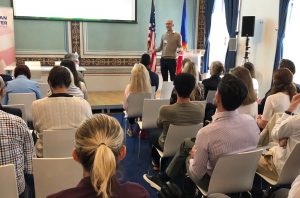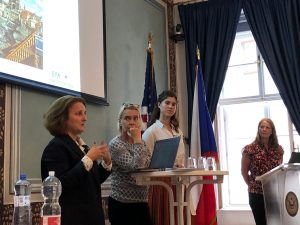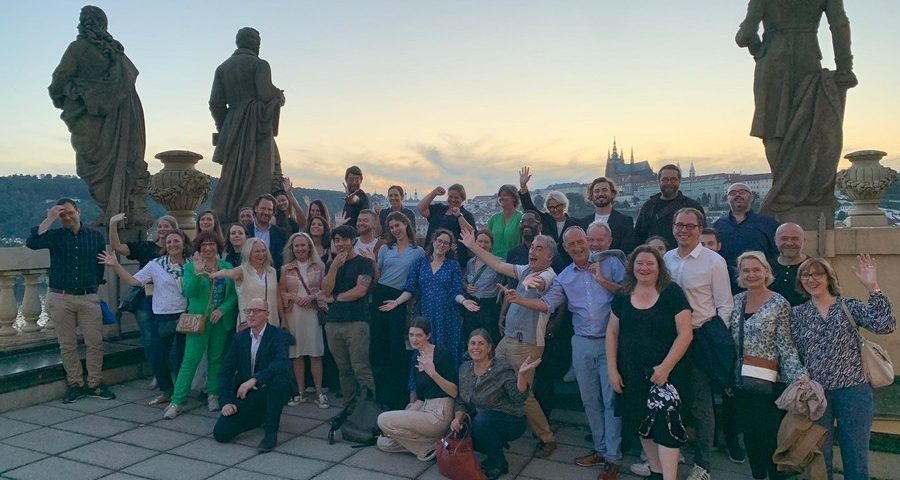
Youth climate activists to give closing address at IFC 2023
October 4, 2023
Time for fundraisers to consider implications of ‘disintermediated’ players
October 4, 2023A record number of representatives from fundraising associations, sector bodies, nonprofits and tech experts across Europe attended EFA’s 14th annual Skillshare in Prague last month.
Hosted by the Czech Republic’s Coalition for Easy Giving, the two-day event saw around 50 delegates share insights, expertise, and views on the theme of Elevate & Innovate: Empowering Fundraising in Europe.
First up on the Skillshare programme for day one was a session on EFA Certification and the professionalism of fundraising. Presented by EFA Board member Siri Nodland, it included a look at the benefits of taking an EFA-certified qualification as a fundraiser, how to apply for EFA Certification as a fundraising association or training provider, and the Certification Committee’s priorities for this year.
This was followed by a European Tour with EFA members presenting updates and insights on professional training in their countries, and key fundraising trends, challenges and opportunities. 14 countries were represented, including Finland, Germany, Ireland, Sweden, Poland, UK, and Germany.
Day two took this theme further through presentations on challenges impacting nonprofits Europe-wide, and how organisations including EFA, Philea and Giving Tuesday are responding. This included a special focus on AI that explored its transformative effect on fundraising as well as key issues including ethics and data integrity.
AI – the time is now
 Now is the time to embrace AI – or more accurately in most cases, machine learning – delegates heard, because it can transform fundraising. But nonprofits must also consider the practicalities and ethics of how they use it.
Now is the time to embrace AI – or more accurately in most cases, machine learning – delegates heard, because it can transform fundraising. But nonprofits must also consider the practicalities and ethics of how they use it.
Kicking off the AI focus, in his session Deniz Hassan from the UK’s Astarita Aldrich & Ward took delegates through typical fundraising roles, from individual giving officers to legacy coordinators, and how AI could reshape them for the better.
In two years’ time, he said, today’s philanthropy / corporate manager for example will have evolved into an AI-enabled relationship manager, with AI taking over many of their routine and time-absorbing data-related tasks. This will free them up to manage a much larger portfolio and deliver those all-important high-quality experiences.
“What technology enables us to do is up our game,” he said. “AI will make people so much better at their jobs and make them more money – as long as they embrace it.”
The next session saw Pierre-Marie Boutet from Salesforce reiterating the inevitability of technological change, and asking the audience to consider the cost for their organisations of not moving forward.
“Consider the Red Cross now for example without the internet or social media,” he said. “The question with AI is not do I have to use it? It’s how am I going to use it?”

Pierre-Marie Boutet
Factors for success
But, he said, success hinges on a number of critical factors. Data strategy is fundamental, with AI only as good as the data it’s given. And the more fundraisers learn about how to use AI, the more risks and issues – such as AI bias, and the trust gap – can be minimised.
For those yet to start their AI journey, he added, it’s not as complicated as they may think, and there are plenty of tools available to help. Most importantly, he said, to avoid your organisation being left behind: “You have to start now.”
AI & ethical dilemmas
The final session on AI focused on ethics. While AI may seem like a solution to some problems, such as ‘poverty porn’, it can in fact bring new ethical dilemmas said Rogare’s Ian McQuillan. AI-generated imagery for example raises issues of its own.
“There are two questions to answer,” he said. “One is what are the ethical issues of using AI in fundraising, and the other is, can AI be used to resolve ethical dilemmas in fundraising?”
Who, for example, he asked, is accountable for the actions of AI tools – the developer or the charity? And would AI know the difference between due and undue pressure on donors?
Using it to support ethical decision making also requires careful consideration, he added. So far it has too limited and simplistic an understanding of the ethics of fundraising.
It’s an area the sector needs to look at more closely, in order to identify the ethical issues specific to fundraising so AI can be trained to understand them. “When a new idea comes to the sector, we start running with it, and only start thinking of the ethical issues further down the line,” McQuillan said. To help, Rogare is developing a research agenda to identify these ethical dilemmas.
In the group discussion that followed, delegates noted that smaller organisations were likely to struggle the most with the growth of AI, and that fundraising associations will play a critical role in supporting their members as well as the wider sector.
Responding to issues on the European level
The importance of collaboration – nationally and internationally – was the key message from the second half of the afternoon with presentations on the issues affecting nonprofits and fundraising across Europe.
First providing a country-specific perspective, Médecins Sans Frontières’ Alena Novotná, and Jan Staněk from Oblastní Charita Červený Kostelec shared an illuminating glimpse into fundraising and some of the issues faced by nonprofits in the Czech Republic, including the cost of living crisis, and the difficulty of attracting staff.
EFA’s Brussels correspondent Patrick Gibbels then gave a run through of current EU policy issues relevant to EFA and the fundraising community. These included the anti-money laundering and counter-terrorism financing policy, and the proposal for a regulation on privacy and electronic communications.
Partnerships & collaboration

L-R: Lepetit, Tornikoski, Hanses and Rydh
Presentations came next on key initiatives aimed at supporting Europe’s NGOs across Europe. Giving Tuesday’s Kait Sheridan spoke about the development of a Europe Hub to create new opportunities for partnerships, collaboration and data work across the continent to boost generosity.
In her presentation, Philea’s Hanna Hanses discussed a recent mapping exercise of foundation laws and regulations in Europe, and the barriers to cross-border philanthropy identified. She also spoke on Philea’s European Philanthropy Manifesto – a call to policymakers to work towards a single market for philanthropy with recommendations for achieving this.
A panel discussion followed with EFA president Charlotte Rydh, Hanses, Lepetit, and VaLa’s Pia Tornikoski on the need for collaboration and for a collective voice both within countries and across Europe as a whole, including EFA’s role.
Linked to the Skillshare theme and the event’s discussions, the afternoon ended with a talk from Charities Institute Ireland’s Annelies Coghlan on Dan Pallotta’s new film Uncharitable. A film that looks at how restraints on nonprofits undermine their potential, CII recently hosted its only Irish screening.
Summing up at the end of the event, Rydh said:
“Fundraisers across Europe face many of the same challenges – and opportunities. The value of coming together at Skillshare to share how our organisations and countries are responding, to learn from each other, and to discuss how we can work on these together is immeasurable.”
Skillshare 2024
Next year’s Skillshare and AGA will take place in Zürich on 26-27 September 2024. All fundraisers and others working in the civil society sector are welcome to join. Details to follow.
Check out 2023’s programme here.




